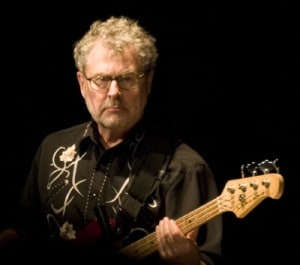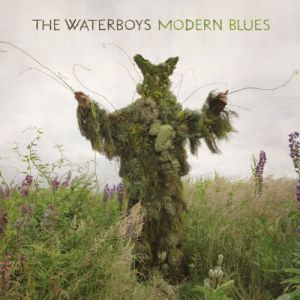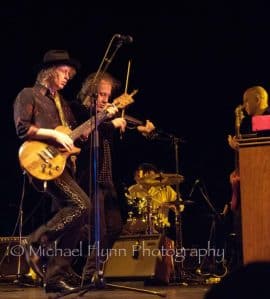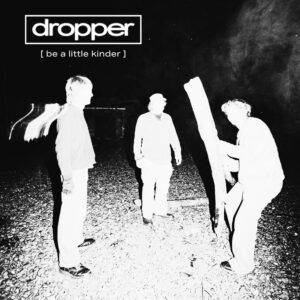The Waterboys: Still Flying Their Freak Flag High (Interview)
The Waterboys are about to release their new album, Modern Blues, tomorrow. Many fans of the Celtic rockers will remember their sizzling show at Auckland’s Civic Theatre in January of 2013 when Mike Scott and the boys made their first-ever stop in New Zealand. Modern Blues is being hailed as The Waterboys’ best album since 1988’s Fisherman’s Blues. The record was recorded in Nashville and features legendary Muscle Shoals bassist David Hood, who has since become a touring member of the band. The 13th Floor’s Marty Duda spoke with Mike Scott about the making of Modern Blues and about his vision of rock and roll heaven.
Click here to listen to the interview with Mike Scott of The Waterboys:
Or, read a transcription of the interview here:
MD: You just got through playing a show in Limerick, am I correct?
MS: Limerick and then Amsterdam, yeah.
MD: Oh okay, and these are the first shows with the new line up? Is that right?
MS: Yeah.
MD: So how did it go?
MS: It went great, thank you.
MD: excellent.
MS: Absolutely great.
MD: And the main change in the line-up is the addition of Zach Ernst and David Hood, am I correct?
MS: Yes.
MD: So for folks who… I know definitely who David Hood is, having listened to his music for a long time… maybe you can tell folks a little bit about why each of them are in the band these days.

MS: Well we recorded in Nashville Marty, and I recorded in Nashville because they’ve got such great studios there and such great musicians and I wanted to make a record with an American feel and our manager Lisa recommended David Hood for bass. Now I knew David, of course I knew David’s music and his reputation, I just never would have thought of asking him to play on the record. But the moment it was presented to me as a suggestion I thought, ‘That’s a winner, he’s the guy,’ and he agreed to play and he came and he was absolutely fantastic. He must be the best bass player I’ve ever worked with and he raised everybody’s game. And Zach is a young guitar player from Austin. He came much the same way, I wanted a guitar player who could play in that old Southern soul style.
MD: Right.
MS: That kinda late 60s, Muscle Shoals, Memphis style. And again Lisa, our manager was the agent of change here. She knew Zach and recommended him and I checked him out by the miracle of YouTube…its very handy for checking out musicians… and he came and blew us all away in the studio.
MD: I see. But it’s one thing to have them play on your record and it’s another one to have them actually join the band and tour. So how did you manage to finagle that?
MS: Well, I just asked them.
MD: Right.
MS: Again with David, it was the case that I had thought that wouldn’t it be great to have David Hood on stage every night, but I thought, he’s older than us, he’s not a touring musician, he’s a studio musician, he probably wouldn’t do it. And then one day I thought to myself, ‘No, just ask, ask and you shall receive’. So I did and I did, he said yes.
MD: And so what’s it like having him on the road with you?
MS: Oh it’s fantastic. Well he is a really beautiful guy, he’s a great guy to be around. His playing is so fantastic, it lifts the show. He really is a master musician.
MD: Oh okay. So you mentioned that you wanted the album to have a kind of Southern soul sound. The music of The Waterboys is always kind of, you know, associated with a specific place, which is not Memphis or Nashville or Alabama, so what made you want to kind of shift your sights to that part of the country?
MS: Well you know, I’ve listened to soul music all my life. I grew up in the 60s and was very familiar with Tamla-Motown, all those great hits I came to hear on the radio as a kid. And these days when I listen to music for leisure I listen to soul music from back then, 64’ to 71’ that’s the golden era.
MD: Right.
MS: To my mind and so I guess it was inevitable that at some stage I’m gonna wanna draw those influences into the sound of the band. Now we haven’t made a soul record, we made a rock ‘n’ roll record, but it does have a Southern soul influence on it, certainly you can’t put David Hood on a record without having that effect.
MD: Yeah.
 MS: And it was Zach and Brother Paul, our keyboard player, is from Memphis, he’s the third in the triumvirate of the incoming American sound. They’ve got a wonderful Southern feel.
MS: And it was Zach and Brother Paul, our keyboard player, is from Memphis, he’s the third in the triumvirate of the incoming American sound. They’ve got a wonderful Southern feel.
MD: Were you thinking of that sound when you were writing the songs?
MS: Yeah, I was yeah.
MD: And so I’m hoping that maybe we can…I’ve had a chance to hear the new album a few times and I’m really enjoying it…so I’m hoping maybe we just go over, I can mention a couple of songs and you can maybe talk a little bit more in-depth about it. Maybe starting out with the first single which is one that folks might have heard by now, November Tale.
MS: Well that song began as a folk-rock ballad and when we got in the studio, it didn’t work and bit by bit we took it to Memphis.
MD: You took it to Memphis.
MS: Yeah, we took it Memphis. I don’t know what else to say about it.
MD: That’s all you need to do is take it to Memphis and you’re all set.
MS: Yeah.
MD: I see, all right. I mean it does have…you can hear that Southern soul feel and that bass, definitely kind of sets the mood for it, doesn’t it, yeah.
MS: Yeah and the guitar and the keyboards work beautifully in that track, that’s Zach and Brother Paul. And I think that song has the Southern feel more than any other track in the album.
MD: Right. Now the other one I was, one of the other ones I was interested in is I Can See Elvis. Anything that mentions a lot of other musicians, you know, always kind of pique folk’s interest.
MS: Yeah.
MD: What was the inspiration for that?
MS: Well it was something that somebody said. We were having a conversation after a show one day and we were talking about near death experiences, you know, those stories that people bring back where they go I almost died and go through a tunnel and see a light at the end of a tunnel.
MD: Right.
MS: And our drummer was a bit of a joker and he started pretending to be a guy going through the tunnel and when he got to the light at the end he knew he was in heaven because he could see Elvis. And I’ve got this memory of him with his eyes closed going, ‘I can see Elvis!’ for a joke and I thought, ‘that is a great line there’s got to be a song in that’. So I kept a note of it and a few years later turned it into this exploration of the rock and roll afterlife.
Click here to listen to I Can See Elvis from Modern Blues:
MD: Right.
MS: What would Elvis be doing if he was in heaven?
MD: Its almost kind of an updated version of the old song Rock and Roll Heaven that The Righteous Brothers did.
MS: Oh I’ve never heard that.
MD: Oh yeah. It was a big hit in around 1974 I think.
MS: Okay.
MD: They mentioned…
MS: Is it about Buddy Holly and…
MD: Yeah, yeah, exactly.
MS: Okay.
MD: And the one that kind of wraps up the album is this big epic track called Long Strange Golden Road.
MS: Yeah.
MD: What’s that all about?
MS: Well it’s a semi-autobiographical but also fictional song, kind of weaving together at different strands. It was a lyric that I had written, I had written the first verse and forgotten about it and I discovered it in a journal, I don’t know, 8 or 10 years later and I thought now that’s a good verse I’ve got to use that. I couldn’t remember writing it so I had to google it to make sure it wasn’t someone else’s.
MD: Right.
MS: And fortunately, none of the phrases came up. So I was confident that I had written it so then I wrote the rest of the song and heard the music in my head and that was it really. Not much else to tell. I like long songs.
MD: And do they even get longer when you perform them live?
MS: That one doesn’t, but some of them do.
MD: There’s a reference in there to Dean Moriarty’s ghost I think, searching for secret knowledge. Is that something that you’re doing constantly?
MS: From time to time, yes. Yeah and I just read On The Road when I wrote the song, I don’t know if you know but I’m presuming you do, but in 2007 they published the original scroll version, which was the legendary version of the book that Kerouac had written in one free burst on a single scroll of paper.
MD: Right.
MS: I found that so inspiring. It’s just a wonderful tract of words and I’m sure that, that inspiration kind of found its way into this song.
MD: Right, right. Yeah and what other songs would you kind of choose to tell people about at this point just as the album’s coming out.
MS: Oh well one of my favourite tracks is Still A Freak and I often get asked about that one in interviews. People wonder well who’s the freak, what’s that all about and its autobiographical, it’s me, I’m still a freak. I don’t mean a freak like the bearded lady in the circus.
MD: Right.
MS: I mean a freak like in the late 60s when you flew your freak flag high.
MD: Exactly. As David Crosby said.
MS: Yeah, that’s right. It’s a song about being an individual, about being true to yourself.
MD: Do you think that’s still an attitude that musicians have or…it’s been a long time since that term was actually used.
MS: Yeah.
MD: But it’s still, for some folks, an important thing, but I don’t know if it kind of permeates through things anymore.
MS: Well I think culturally we are all more individuals now than we were in the 60s. We needed ideas like that to shake things off in the 60s because they was so much conformity. Nowadays I think there’s a lot less conformity, everybody’s got their own favourite music and their own favourite way of dressing, everybody walks with their own tribe.
MD: Right, but those tribes still kind of have a uniformity about them. I just went to see a band called The War on Drugs last night.
MS: Oh yeah, I know of them.
MD: And it was a fantastic show. But, you know, you can kind of tell what the audience was going to look like before you got there. They were all kind of what they call hipsters, you know, with the beards and the colourful shirts and you know, whatever. So I guess it’s still a thing that you know there is this conformity even among the people who think they’re kind of being different.
MS: Yes, that’s true. I don’t know what to do with that, no comment.
MD: Fair enough. So I get the feeling that the 1960s looms large musically for you even now.
MS: Yeah.
MD: What kind of stuff were you listening to? You mentioned Motown and things like that. What other things were you listening to when you were growing up?
MS: Oh The Beatles, The Stones, The Who…all the pop music that was in the charts.
MD: Right.
MS: When I was a teenager I listened to Bob Dylan, David Bowie..
MD: Yeah.
MS: And then Punk Rock when that happened. I listen to a lot of contemporary music too.
MD: Yeah, what kind of stuff?
MS: I like The War on Drugs for example that you just mentioned.
MD: Yeah, it’s a really good album and they put on an amazing show. And speaking of amazing shows. I just, I don’t know if you remember the show you played in Auckland here in January.
MS: Oh I do, yes.
MD: That was incredible.
Click here to read The 13th Floor review of the concert.

MS: Thank you. I remember that terrific show, great venue, great audience.
MD: Yeah, I mean are all your shows like that or was that something out of the ordinary?
MS: Gosh, I don’t know. That whole tour, that was a very special tour cause the first time in Australia and New Zealand. So that was an extra, there was a sense of, even though we haven’t met this audience before I know a lot of them have grown up listening to our music. So there was this festive sense, there was a sense of reunion in the air.
MD: Yeah.
MS: So that was special, that’s not at every show.
MD: Yeah, yeah. I mean I just remember being totally blown away in a very good way and the band itself I mean you’ve worked with dozens of musicians over the years as part of The Waterboys. Is that a good thing to be able to keep people coming and going and moving in different things or would you ideally prefer to have worked with, you know, a stable group of cohorts?
MS: No I like it the way it is and I always have. There have been a few frustrating times where we haven’t been able to find the right drummer for a while. I remember the late 80s that was the case.
MD: Right.
MS: But usually I find myself surrounded by great bands and it works. We’ve had more members I believe than any other band in rock history.
MD: There you go. That’s…
MS: The nearest challengers are Santana and The Fall.
MD: I think you’re destined for the Rock and Roll Hall of Fame just on that one if nothing else.
MS: Yeah.
MD: But the one person that’s kind of been a constant is Steve Wickham who’s been playing with you on and off since what like 1985.
MS: 1985 yeah, the great fiddler, yeah.
MD: Yeah. So what is it about him and is there something that keeps the two of you together?
MS: There is yes, with an incredibly close musical connection and it’s very versatile too. Any kind of music I want to play Steve will be there. I can rely on him, I know that if we go to country or psychedelic fuzzy rock and roll or folk, he’ll be there.
MD: Right.
MS: Whatever direction the music’s in, he can adjust to it and in fact he can do brilliant things with it.
MD: Right, right. So when you were about to go to Nashville and record Modern Blues and you were taking this kind of Southern soul turn did you have a discussion with him or did you just kind of pick up on each other’s vibe and take it from there?
MS: It’s more like what you just described.
MD: Right.
MS: it’s the second. But Steve plays less on this record than most albums, he’s only on two tracks. And it’s not because we were going in a Southern soul direction, it’s simply because on a lot of these songs, there wasn’t anything for a fiddler to do.
MD: Right.
MS: Fiddle is a, it’s not a central rock and roll instrument so it doesn’t have to be in every song and he’s cool with that.
MD: Right, right. How has your musical vision changed over the years? Do you feel like the same way about music now as you did, say when the band was starting in the early 80s?
MS: I’m much broader musically, that’s all I can say really. I’ve still got the same hunger to play music and make records and do great shows.
MD: And what about on stage, is it the same kind of feeling?
MS: Yeah, really it is, yeah. But I’m much more experienced. Before, when I was a kid, I’d be doing shows without realising I was doing it, I would spend loads of my energy during the day sightseeing, going around exciting new cities, taking it all in. And then I’d be tired on stage and these days I don’t do anything like that. Every bit of my day is stock piled for the 2 hours that I’ll be on stage, all my energy is banked for that time.
MD: Word to the wise for younger players, no doubt.
MS: Well all in its own time. You have to be young when you’re young.
MD: Right, right. Yeah, I think somebody at the show asked a guy at The War on Drugs what he’d done all day, you know, how he liked Auckland and he basically just said oh we just went to a restaurant and hung out, then we played our show because you know.
MS: Yeah, good for him.
MD: So it looks like 2015 is going to be a pretty busy year for you guys, I see you’re already announcing tours in November and December. Do you plan on making an appearance down in this part of the world again?
MS: We do, yes. I think we’re going to be playing Auckland in early April.
MD: Oh fantastic.
MS: I’m waiting for the final confirmation.
Modern Blues is released January 23rd in New Zealand.
- Greta Van Den Brink – GIMBGTBLBM: 13th Floor New Song Of The Day - 05/12/2025
- Steve Cropper Has Died Age 84: R.I.P. - 04/12/2025
- PRINS – Heaven Or Hell: 13th Floor New Song Of The Day - 04/12/2025
